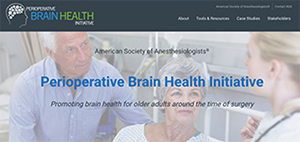- ASA Brain Health Initiative (PN115)
- 1:10-3:10 p.m. Saturday
- BCEC Room 153ABC
Details of the ASA’s new public safety campaign, the Perioperative Brain Health Initiative, will be explained during a special session Saturday afternoon. It will feature six presentations about the Society’s efforts to reduce cognitive changes and delirium following surgery.
 Speakers will explain why the initiative was developed, the science of postoperative cognitive dysfunction, the role of preoperative screening, what anesthesiologists can do to reduce delirium and the postoperative role of anesthesiologists.
Speakers will explain why the initiative was developed, the science of postoperative cognitive dysfunction, the role of preoperative screening, what anesthesiologists can do to reduce delirium and the postoperative role of anesthesiologists.
“We are not really talking about a public health safety initiative for which anesthesiologists are solely responsible, but about joint accountability, not something we own by ourselves,” said Lee A. Fleisher, M.D., of the initiative. “This is a real public health issue that is underappreciated, particularly the cognitive changes after surgery.
“The issue of delirium has received increasing attention because of its influence on complications and length of stay. We can we inform patients, their families and caregivers about how the elderly brain responds to the stress of surgery and anesthesia and what we can do preoperatively, intraoperatively and postoperatively.”
Dr. Fleisher is the Chair of the ASA Ad Hoc Committee On Brain Health Initiative. The initiative was formed under the leadership of 2016 ASA President Daniel J. Cole, M.D. The committee developed the initiative with input from several medical specialty societies as well as the American Association of Retired Persons (AARP), the Centers for Medicare & Medicaid Services and the American Hospital Association.
“We have spent the last year defining what the ask is of all these groups and what we can do to help inform anesthesiologists and help them, in turn, inform their hospitals and their patients,” Dr. Fleisher said. “In addition, what we want to do is inform the payers as well as the funders of research.”
A key in communicating information to all stakeholders is the recently launched Perioperative Brain Health Initiative website. The site offers links to a variety of resources for anesthesiologists, including treatment guidelines, the latest research and publications, case studies, improvement resources and treatment tips.
The Society is partnering with AARP to educate patients, their families and their caregivers about the facts of cognitive changes and delirium following surgery.
“We want to make sure that when patients leave the O.R., they have less delirium, partly because of our involvement,” Dr. Fleisher said. “If they have cognitive changes, their families and caregivers should be aware of those cognitive changes and that they are almost always short-lived. We believe they are a function of the stress of surgery and anesthesia.
Return to Archive Index